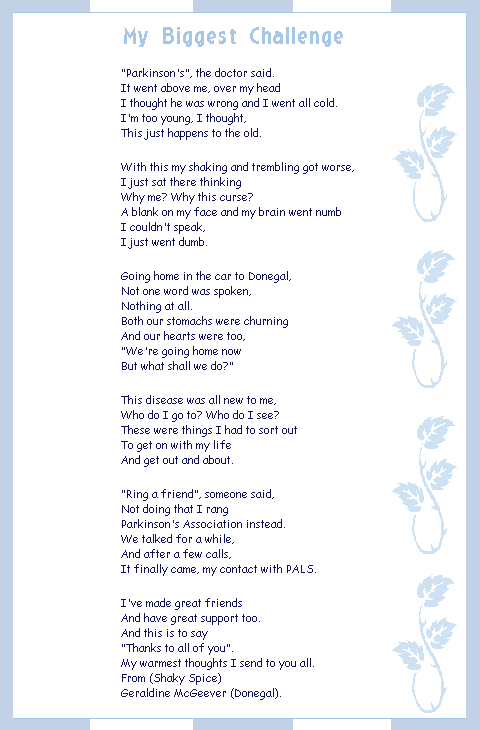
TOPIC INDEX
Handy Hints
Voice & Speech
PD Poetry
Massage Humour
PDNS News
PALSWALK
Midges Story

Selected items from our Newsletters! To access, click on one of the Topic Index links to the left below.
Disclaimer: The views expressed in these articles are those of the authors, and PALS cannot be responsible for them. Queries regarding treatment options for PD should be addressed to your GP or Neurologist.
| HANDY HINTS |
These are a few hints we have come across:
|

| VOICE AND SPEECH IN PD |
 Sixty to eighty per cent of people with PD have voice and speech problems.
Many people report that they feel like their voice is as strong as it ever was,
but that when they speak in a loud voice, they feel like they are shouting.
However, most PWPs report that they are often asked to repeat themselves. Sixty to eighty per cent of people with PD have voice and speech problems.
Many people report that they feel like their voice is as strong as it ever was,
but that when they speak in a loud voice, they feel like they are shouting.
However, most PWPs report that they are often asked to repeat themselves.We do most of our communicating using the spoken word. We use speech and/or understanding of speech to greet people and tell them our news, to ask and answer questions, and to use the telephone. Often, we accompany the spoken communication with facial expression and gestures to convey our feelings. It can be very frustrating, especially when with a group of people, if your speech is not easily understood. If your voice is low or your speech slurred, this will put a strain on the person trying to listen and understand you. When this first happens, your instinct is to say no more. This in turn alienates you from the group. Get help from a speech therapist. Not knowing whether or not you are being understood can be depressing. The level and pitch of your voice can be increased with the right training from a speech therapist. What can you do to help a person to communicate?
|


![]()

![]()

| IT'S ALL IN HOW YOU LOOK AT IT! |
|
From a PAL in County Meath: "Having taken Madopar for nine years, I am experiencing periods of dyskinesia in my legs and feet, which can cause me discomfort. However, our family dog, 'Trixie', is not complaining. When my legs become 'active', Trixie rolls over on her back in front of me. I rest my feet on her tummy, and she receives a lovely massage from my dyskinetic legs!" |
| PARKINSON'S DISEASE NURSE SPECIALIST NEWS (May 2000) |
As most of you already know, Ireland has one neurologist per 350,000 people, about one-third of the accepted minimum, and the lowest number of neurologists per head of the population in Europe! Many other countries now have "Multidisciplinary Care Teams", which usually consist of the following: neurologist, Parkinson's nurse specialist, physiotherapist, speech and occupational therapist and psychologist, who as a team provide care and support to the people with PD. This concept is called "Co-ordinated Care in the Community". It has been found that the use of multidisciplinary care teams leads to an enormous increase in the quality of life for the patient. It also reduces the number of times a patient has to be admitted to hospital. For instance, a patient may be taken into hospital for drug adjustment, or to be started on a new drug. This is unsettling for the patient, but if there is a Parkinson's nurse specialist available, the adjustments may be made at home - a financial saving for the state and an emotional saving for the patient and his family! A PDNS receives specialised training to enable him/her to maximise each patient's condition on an individual basis. A Parkinson's Disease Nurse Specialist (PDNS) liases between the specialist and the GP or other therapists on the patient's behalf, informs the patient about PD, evaluates him/her in the home environment, educates partners about their roles, and informs the public about PD. There are now 70 Parkinson's Disease Nurse Specialists in Britain, one in Northern Ireland with another to be appointed in the near future. Initially the PDS paid their salaries, and still do in some cases. What seems to happen in England is that the local Health Board takes a year or two to evaluate the new contribution to treatment for PD, and, in most cases, funds or part-funds them after that. So it means fundraising or obtaining sponsorship for the first year or two. Which leads to the present. Brian Magennis, David's son, is a qualified nurse working in Galway. On his own initiative, he has enrolled in a degree-level Parkinson's Disease Nurse Specialist course in the University of Plymouth, taking unpaid leave from his job. He has completed the first leg consisting of an intensive series of lectures along with practical sessions with patients. He has now returned to Galway, where, as part of this course, he is undertaking a clinical study. In May, he will return to Plymouth for the final series of lectures. Therefore, in late June or early July, Ireland will have its first qualified Parkinson's Disease Nurse Specialist! A number of our neurologists have expressed a keen interest in having Brian work with them. Brian has a great wealth of practical experience with PD through his Dad, and has returned from the first leg of his course full of enthusiasm and new ideas and insights!
|

| FROM A KERRY PAL! |
Summer is here, time for Bar-B-Q's. We had just finished building our new Bar-B-Q, very nice, made of stone, so we had to inaugurate it, of course, and see if it worked. My daughter's boyfriend is a chef and he automatically took over the cooking. I was thrown out of my own kitchen and happily joined the other expectant and starving guinea pigs in the garden. The Bar-B-Q worked like a charm, the food was delicious and we were enjoying a glass of wine when the invasion started: midges! They were out in force and taking bites out of everyone, that is, everyone but me. I was baffled. I was normally the first one they would zoom onto and I would get bitten to bits by them. Eventually I was abandoned to enjoy the lovely evening by myself. Everyone else was driven off into the house, while I still had not been even looked at by a midge. When I joined the others, my daughter piped up with the solution to the puzzle: "Sure Mum, look at this from the midges' point of view. With all the different tablets you are taking, you are a walking chemical disaster, and your blood must be pure poison at this stage. If I was a midge, I wouldn't touch you with a barge pole!" And come to think of it, if I was a midge, neither would I!
|